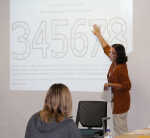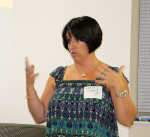Local daycare providers get update on R-5 services

Daycare providers got an update on Nevada School System services and an in-depth look at Nevada and Missouri school guidelines during the Early Childhood Forum hosted at the Healthy Nevada conference room on the second floor of the Nevada Public Library.
Those attending heard a variety of topics, ranging from presentations on what preschoolers should be doing verbally and physically in relation to the skills and abilities needed to start school.
Sessions included "Emerging Preschool Curriculum," "School Readiness Expectations," "Networking and Resources within the Community," and "Developmental Information."

A short video was shown from the Missouri Department of Education's early learning department website titled, "Now for Later: Investing in Early Learning."
The idea for the forum came from collaboration among district preschool, kindergarten teachers and Parents As Teachers educators. "It was thought that having an informational meeting including private preschools and daycare providers could result in better communication between all the entities in the community that help prepare children for kindergarten," said Debbie Spaur, principal at Bryan Elementary, Early Childhood director for Nevada R5, and one of the introductory speakers at the forum.
In addition to Spaur, guest speakers were Laurie Heuser and Donna Tabor, district preschool teachers; Sonya Haller and Janie Watts, district kindergarten teachers; Stacey Wilson, On My Own, Inc., development and community relations director; Lynnette Foster, district Parents As Teachers coordinator; Ellen Byergo district speech pathologist; and Karen Claypool, district contracted occupational therapist.
Crystal Burch, Nevada Parents as Teachers educator, led the meeting.
Spaur discussed the Missouri Department of Education's current initiative "Top Ten by Twenty" to achieve three goals by 2020 and to be in the top 10 states in academic achievement by that time.
The goals are:
* All Missouri students will be college and career ready.
* All Missouri children will enter kindergarten prepared to be successful.
* Missouri will prepare and develop and support effective educators.
"It is the goal for the state to expand opportunities for quality voluntary early childhood education," said Spaur.
"Research is clear that children who enter school ready to meet its academic, social and emotional demands are more likely to achieve success in academics and in life," according to the DESE website.
"States that want to increase college and career readiness and success must be strategic and coordinated in their investments in these early years.
"These include programs to ensure access to quality childcare, preschool, family support, child health services and early identification and intervention for infants and toddlers with disabilities.
"Long-term benefits of high quality early childhood education include an increased rate of high school graduation and a decrease in the rate of criminal activities."
Preschool teachers gave a report on their newly adopted curriculum, "The Emerging Language and Literacy Curriculum."
The Early Language and Literacy Curriculum is an integrated-intentional curriculum that targets experiences in all developmental domains with a language and literacy rich program.
According to the presentation by Laurie Heuser, Donna Tabor and Sara Parrack, the program addresses all these domains through theme-based units, children's literature, multisensory activities, scaffolded instruction and parental involvement and does so by creating an engaging environment with activity and play-based learning.
Tabor, a veteran Nevada preschool teacher and former teacher of deaf education, noted, "This research-based curriculum is one of the best I have ever used. I love how it enhances the children's language and learning.
"It prepares preschoolers for success in kindergarten and gives them a strong foundation in oral language and literacy."
Watts started her presentation with a thank you to all of the preschool teachers and daycare providers.
"As a former private preschool teacher myself, I want to thank all of you for helping us get preschoolers ready for kindergarten. I know how hard you all work."
She and Haller shared kindergarten first quarter learning targets, as well as writing samples of a typical kindergarten student on the first day of school, the middle of the year and at the end.
Wilson gave a report on all of the services offered through On My Own, many of which apply to preschool students. She also distributed a resource guide to all attendees outlining resources provided by On My Own, Inc., and other community programs.
She reported that her organization is available to present programs during October, which is "Disability Awareness" month.
Foster reviewed the services offered by the Parents As Teachers program. She explained the recent changes where area parent educators will see fewer families for home visits but will see those families more often.
She talked about mass screenings that are made available through the district twice a year for children ages 3-5. If a parent or caregiver suspects a developmental delay, a screening can be performed any time by contacting the parents as teachers' office at 417-448-2061. Children as young as three months can also be given screenings through the Parents As Teachers program.
Byergo explained what speech errors are developmentally appropriate for children ages 3-8. Often parents and caregivers think a child needs speech therapy when in fact the errors they are making are appropriate for their age and most likely will be outgrown, she said.
She also noted which speech errors are not appropriate and could qualify a child for speech therapy. She explained the referral process for speech therapy for a preschool student.
Claypool gave several hands-on demonstrations of ways to encourage hand-eye coordination. She explained how important "tummy time" was for babies and even older children as it strengthens the child's core, which in turn can promote strong fine and gross motor skills.
She provided many materials and activities for participants to take home.
The meeting concluded with a short question and answer period. Plans are under consideration for making this forum a yearly or at least bi-yearly event, said Spaur.
